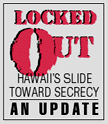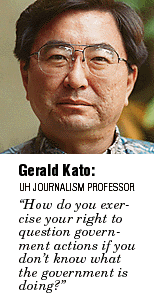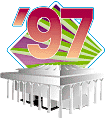


 Theirs is a vigil that never ends.
Theirs is a vigil that never ends.
But for four months each year, the small corps of government watchdogs who monitor the state Legislature shift into hyper-alert. This session some are sensing trouble. They fear public access to information may take a drubbing.
Being closely watched are bills that would limit access to voter registration rolls, allow counties to bypass notice requirements for emergency meetings and allow agencies to assess fees for development costs of electronic records. Closely watched bills that would delay public access to state job-site inspection reports following an accident have stalled in the House. In all, the state Office of Information Practices is tracking more than 120 measures that relate to information flow, many of which deal at least tangentially with government openness.
That's three times as many as last year.
But OIP Director Moya Davenport Gray doesn't discern a negative pattern.
"I don't think what you're seeing is a trend to close off access," she said.
Rather, Gray sees a group of lawmakers who have taken newspaper headlines on their 1996 malaise "very seriously" and have drafted a raft of bills "in response to that impression." She said her office is looking at a wider variety of bills that affect government information practices this year.
 As an example, Gray pointed to several similar sex offender notification bills introduced at the outset of the session.
As an example, Gray pointed to several similar sex offender notification bills introduced at the outset of the session.
"Those tend to reflect the community's concerns," she said.
But University of Hawaii journalism Professor Gerald Kato believes there's ample reason to worry.
"People ought to be concerned," said Kato. "It's not just a media issue. The media fights for access to information because the public has a right to know. How do you exercise your right to question government actions if you don't know what the government is doing? I sense a backlash to openness of public information."
Larry Meacham of Common Cause Hawaii has identified what he believes are the most egregious anti-openness bills and has showed up at committee meetings to testify against them.
"Every year there are several bad ones," he said. "It never fails. The agency finds it inconvenient to provide information to the public. So they introduce those bills. They seem to think it's their information. But it's the public's."
Kato contends some lawmakers draft bills shutting off the flow of information to lash out at the news media.
"But who are they really hurting?" Kato asked.
Sen. David Ige (D, Pearlridge) said he believes legislators are among those most committed to public openness.
"We're working real hard not to close off information to the public," he said. "Different legislators act differently. Some are more committed than others. But I think elected officials are the ones who are interested in keeping the flow going. They are more keenly aware or promoting public access."

"For every case we've won, they've got a bill to reverse it," Portnoy complained.
He cited recent rulings on access to voter registration lists and Occupational Safety and Health accident inspection reports as examples.
Portnoy and various Hawaii media outlets won court rulings on those fronts last year; bills were introduced this session in the Legislature to counteract them.
"It's hard to indict the entire Legislature," said Portnoy.
"There are lots of reasons that a bill gets introduced. xxx But it's an ominous trend. ... By the end of crossover, we'll know if the public is getting shafted."

"I have grave concerns about making an individual's address publicly known when the individual has a true reason for confidentiality," he said.
Chumbley noted that after U.S. District Judge David Ezra ruled the voter lists should be open, convicted felons contacted the elections office asking for the addresses of judges, prosecutors and jury members.
"That is totally unacceptable," Chumbley noted.
Openness advocates maintain that access to voter rolls is essential in a Democracy. But Meacham said his group believes there is "middle ground" the Office of Information Practices can help find.
Gray said the OIP would work closely with elections officials to "balance the public's right to challenge someone's right to vote against those who would harass" should the measure pass.

"The fact that such a bill would even be introduced raises alarm as to really what the legislators' commitment is to public access to information," said Kato.
Some question why lawmakers are exempt from the state Sunshine Law. That means that both chambers -- dominated by the Democratic Party -- can debate issues behind closed doors before convening for a vote.
Meacham and his colleagues are also tracking a number of measures they believe will improve public access.
They include a bill that would fund televised legislative hearings and two that provide for public notification when a convicted sex offender moves into a community.


A look at '97's bills and what they could do to public access
Pending
SB 1074, HB 1410: Would allow the chief election officer to remove an individual's address or telephone number from public voter registration records when a safety threat exists.
HB 2134: Would allow county corporation counsels to declare conditions for an emergency meeting exist and allow public boards to forgo public notice requirements.
SB 1357: Would require minutes of the subsequent meeting to reflect the names and topic of discussion when less than a quorum of a board meets.
SB 1919: Would permanently fund televised legislative hearings.
SB 1285: Would allow competition within the print media for public legal notices while establishing a consistent mechanism for dissemination.
SB 1859: Would allow counties to assess fees for copies of electronic records and recoup the data base development costs.
SB 838: Would require release of information on convicted sex offenders.
HB 102: Would provide that the director of the state Department of Labor and Industrial Relations has the discretion to make certain government records on coordinated care organizations confidential.
HB 371: Would establish immunity from liability for giving job references. May eliminate privacy protection for government employees' personnel files.
HB 1828: Would restrict access to vital statistics index data, the release of which could inadvertently reveal confidential information and be used for fraudulent purposes.
Shelved
HB 1245: A measure that would impose penalties on anyone divulging the details of voluntary environmental audits.
HB 461: A measure that would make public the financial statements of state board and commission members who are subject to confirmation. It would also make public the statements of state employees now required to file financial disclosure statements who make more than $50,000 a year.
HB 528: A measure that would require the ACCESS legislative information service to contain current voting records of all legislators on all measures voted on in legislative committees or on the floor of the Legislature.
